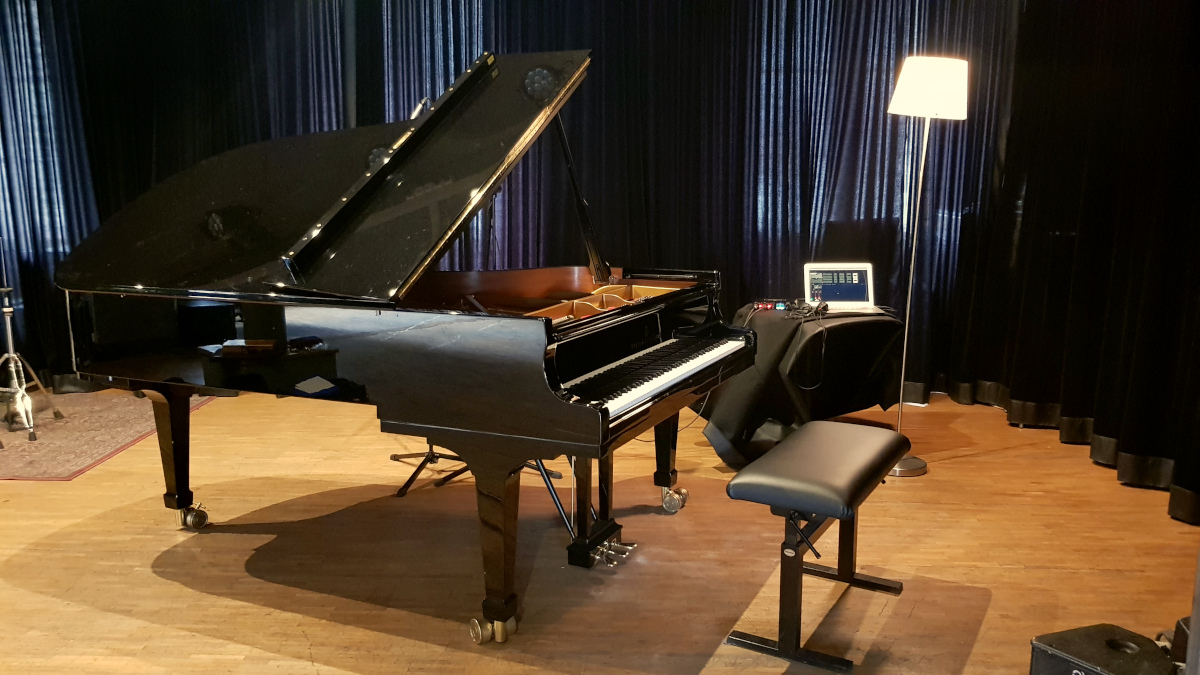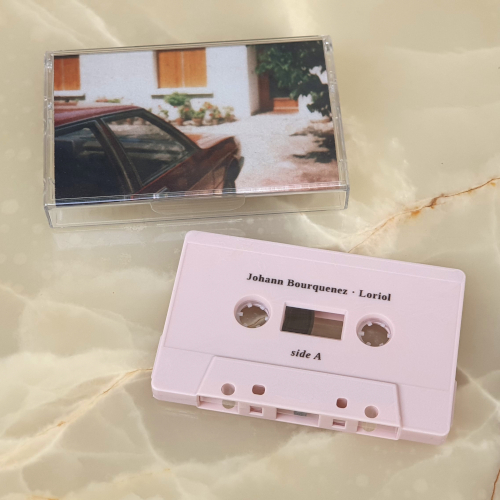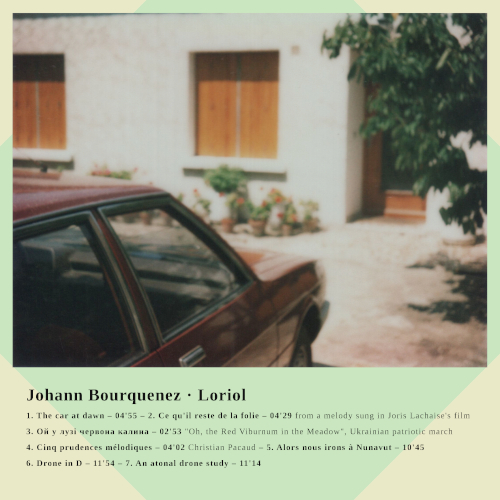Loriol
Presentation
Loriol is Johann Bourquenez's first solo piano album, following a few shorter EPs released over the last 10 years. It features 7 tracks, varying between melodic improvisations, dissonances, polyrhythmic counterpoints and acoustic drones using the piano's natural resonances. The 50-minute album was released on 23 April 2024, in a cassette version (100 copies) and a digital version now available on Bandcamp.
Johann Bourquenez, who gained international attention with the minimalist post-jazz trio Plaistow (2007-2017), offers an eclectic album, which he recorded and mixed himself between Geneva and Loriol, a small French town in the Drôme where he lived for some years. The music is more intimate, and offers a synthesis of his research and new directions on the piano.
Liner Notes
This is my first solo piano album. Up until now I've released a few EPs of a few tracks, which have always been experimental, both in the music and in the way they were made. This time I've chosen a longer format, and I've been able to think about a progression, a coherent whole that takes its time.
Loriol, full name Loriol-sur-Drôme, is a small town in the Rhône valley with a population of around 7,000, right next to the confluence of the rivers. It's rather post-industrial, agricultural, commuting, there's not much going on and it's not very rich. I ended up here after two years in Marseille, having left Geneva in 2017. With Déborah, my partner, we wanted to live elsewhere than the big city, and there was a family house to bring out of decay, and a lonely grandmother to look after.
I cultivated a shared garden there for two seasons (with some success) and campaigned for cycling (without any success). I recorded local friends' rock band, Pixyde, and I was sound engineer for a few of their concerts. I even played a few concerts on guitar and vocals, in a duo with Ghislain Courtial, cabinetmaker. We travelled through the Ardèche in his truck a few times, which was really cool.
When I left Geneva, I didn't really know what to do. I was a bit lost in the music world. I quickly put an end to the few remaining projects after stopping the adventure of my trio, Plaistow, after 10 years of concerts and studios. Nothing was really going anywhere and I didn't have the energy to launch anything else. I was asking myself a lot of questions about the state of the world, the climate, oil, my plane tours and my hamburgers. What could I do that made sense?
In Marseille, I took a short course in permaculture, cultivated a shared garden and worked in a community grocery shop. I also became a climate activist, organising and taking part in conferences, demonstrations and civil disobedience actions. I became a vegetarian. I saw concerts by friends who passed by and by a few local artists. I went jogging, through the port and along the seafront. I loved Marseille, beautiful, sunny, tough, irritating, poetic, dramatic, impossible. Déborah has written a book about the city and her experience there: "À propos de Marseille" (About Marseille).
I didn't play music for a year and a half. I didn't listen to much either, until I listened to the complete works of Coltrane, in chronological order. (What an experience! I'd never 'understood' his free albums from the end. In fact, it's incredibly intense and magnificent. Anyway). I started playing guitar, without thinking too much about it, and I learnt to sing a bit. It was quite an experience to learn an instrument as a beginner, and it did me a lot of good. Learning and playing without false pretences, without pressure, and with less ego. Accepting not knowing such a technique, such a theoretical point, without that being a problem: you can always learn new things after all, can't you?
In Loriol I started playing the piano again, after almost three years without it. Because I felt like it. I didn't miss it until I felt like it again. Despite my more advanced level, I could see that I found it harder to accept my technical difficulties on the piano than on the guitar. In a way, I was able to apply my guitar beginner's attitude to the piano, by trying not to mess myself up with my ego, my anxieties and old habits. And it worked, I feel much more serene now.
I worked in a different way. Pieces by Debussy. Jazz standards. Songs too, just like on guitar. At first I even forbade myself from playing drones and polyrhythmic stuff, to give myself room to experiment, play and work differently. I also started to clean up my technical shortcomings, for example by working on pentatonic scales in all keys. Yep!
I went back and forth to Paris to work with Yael Miller on a piano-vocals duo. We rehearsed songs, funk, pop, a few jazz standards and some improvisation. It was great. We hadn't seen each other for several years and we shared a lot about our musical backgrounds and experiences. We recorded a few tracks with a small upright piano, but we should do better. I thought about moving to Paris.
I went to Berlin, also with the idea of maybe moving there, for the city, for the art scene. I saw a lot of concerts and venues there, and I thought about how to move there, how to work on the piano there, and how to record.
And then I came to Geneva a year ago, after a 5-year absence. I didn't really know what to expect. It was spring, everyone was outside, and I was literally meeting someone I knew every quarter of an hour, it was crazy. I found the grand pianos of the AMR, the jazz club and school where I'd done a lot of work. It was a strange experience to find my feet so quickly in this city. I also accepted that it was cool to play drones and to summon all the harmonics these pianos are just begging to generate. I saw my Jedi master and sound engineer Renaud Millet-Lacombe again. I realised that in Geneva I could work and record piano more easily than anywhere else.
So I started gathering ideas for a solo piano album. I thought that the quickest, the most efficient, the most ninja, would be to do everything myself, the recording and the mix. Besides, I like doing things I've never done before. I bought myself some cheap mics. I did some tests. Renaud lent me some good mics and explained a few things to me. I asked to record on the AMR's Steinway B211 on a Sunday when there was no concert, and the committee agreed.

I recorded on Sunday 25 February. It went really well. I mixed straight away and was able to send a master for duplication two weeks later. I received the cassette and listened to it. There's some hiss, but it's acceptable for a solo piano thing. Plus, it'll be released on my FairCamp site, for streaming and downloading, free of charge, with no enshitified multinationals, no hiss and no cassette player.
The first side features 5 quite different tracks, with polyrhythmic interweavings, simple melodies, less simple dissonances, a few modal improvisations and a nice little drone. The second side is two 11-minute drones, very static and darker.
· The car at dawn was inspired by a photo of Geneviève Cygan, whom I met on the Mastodon social network. Her photo gave me a framework for different ideas I had, and helped me finalise the piece. A melodic motif develops, in polyrhythmic counterpoint to a left-hand ostinato.
· Ce qu'il reste de la folie freely borrows a theme hummed by one of the protagonists at the end of the documentary film of the same name by Joris Lachaise. There is a bass motif in 5 beats, and modal improvisations.
· Ой у лузі червона калина (Oi u luzi chervona kalyna, "Oh, in the meadow, the red viburnum") is a Ukrainian patriotic song. I heard it at the beginning of the war of invasion by Russia. I've been to Russia and Ukraine several times. I walked and played in these cities and felt good there. Seeing them bombed was deeply upsetting. I can't but feel solidarity with Ukraine. This is an arrangement for solo piano that I made for the occasion. Слава Україні!
· Cinq prudences mélodiques is a composition by Christian Pacaud, who I also met on Mastodon. He doesn't play the piano, but he has published a version which he programmed at the computer (very good work, by the way) and asked if anyone would like to play it...
· Alors nous irons à Nunavut is an assemblage of two sources of inspiration: Clare (yes, still on Mastodon) lives in Nunavut, a vast territory in northern Canada, and publishes his incredible photos of snow-covered landscapes, the disappearing sun and Inuit life. The drone that opens the track is a sort of impressionist painting of my emotions in the face of all this. Then there's a darker modal improvisation on two chords, intended to illustrate how I felt listening to Corinne Morel Darleux talk about her latest book, "Alors nous irons chercher la beauté ailleurs" (So we'll look for beauty elsewhere).
· Drone in D, as the name suggests... I developed this drone for a collaborative project by Chelidon Frame (yep, Mastodon), who compiles proposals from several musicians to produce a one-hour drone every two months. So we had to provide him with a drone in D, without a third, and with a few percussive elements. It's fairly static, with the exception of a short melodic line that appears, first on the left hand and then on the right.
· An atonal drone study is also a long, very static drone, which seeks to blur the usual harmonic support points, including those that come, by resonance, from the piano itself. This is probably the darkest piece on the album, but it can be seen as an invitation to a catharsis, or at least to a certain appeasement to be found in the slow contemplation that is offered.
On the cover, it's a family photo from the 80s of the grandmother's house, with the grandfather's car parked in the courtyard. Déborah suggested this image and it immediately seemed obvious to me to use it for the cover, and to call this album "Loriol", as a conclusion to the years spent there. The grandmother has joined the grandfather in the grand infinity, the houses are sold, and we leave for Geneva.
- Johann Bourquenez, April 2024

